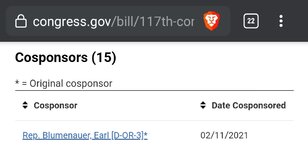I don't think you understand that the CPSC has the legislative power to preempt the 3-class legislation in all 28 adopted states if they agree that it impacts interstate commerce. While mildly complex I do believe I could explain that to a 5 year old - these guys big & can change what they want.Y'know, I think I've tried to make an effort to understand the points advocated in this thread. And what I've understood I honestly haven't liked.
Any advocacy for a rule change is inevitably going to be political. Getting anything done politically is inevitably hard, and getting something done politically when the message and objectives behind it are difficult to understand is harder still. Actually, I'll make that even more explicit: getting anything done politically when the message and objectives aren't easily understood by a 5-year-old is pretty much impossible.
One person, or even many people with one viewpoint, is unlikely to advance any such rule change. In order to advance it you'll need to bring along a lot of other stakeholders with diverse viewpoints and explain clearly what is in it for them. It doesn't matter how brilliant the reasoning (or how just the cause) is, unless there is a large and diverse group advocating for the cause (whatever that cause might be) your advocacy will go nowhere.
It would help me a lot if there was a clear statement of what problem is being solved here. And how solving it will benefit me. From what I've seen and read the most likely result will be there will be fewer places I can ride my fully compliant class I e-bike.
I would be more charitably inclined towards this effort if an attorney involved in consumer products law and individuals involved in access issues for bikes and e-bikes had weighed in and were positive about it. The sense I've gotten is that effort is just too difficult for the people advocating for this and such people wouldn't understand what is being advocated here anyway. Which doesn't impress me at all.
What I am left with is that while I do not doubt the technical brilliance and likely merits on a purely technical basis, this whole thing makes no sense at all either from a business standpoint or a political standpoint. So it is unlikely to go anywhere constructive.
Your class 1 ebike is fully CPSC / federal definition compliant. You will loose no ridding privileges. I have no idea why that keeps coming up when nothing in this tread hints at that except for some expressing that as concern with no basis presented. If a CPSC / federally compliant "low speed electric bicycle" is just defined as a "bike" (ie equivalent to any other bike type like road/mtn/cruiser/recumbent/trike/etc.) and never to be consider a motor vehicle, then the only way anyone looses access is by some land manager having his/her feelings hurt and banning all "bikes" and I don't think that happens.


